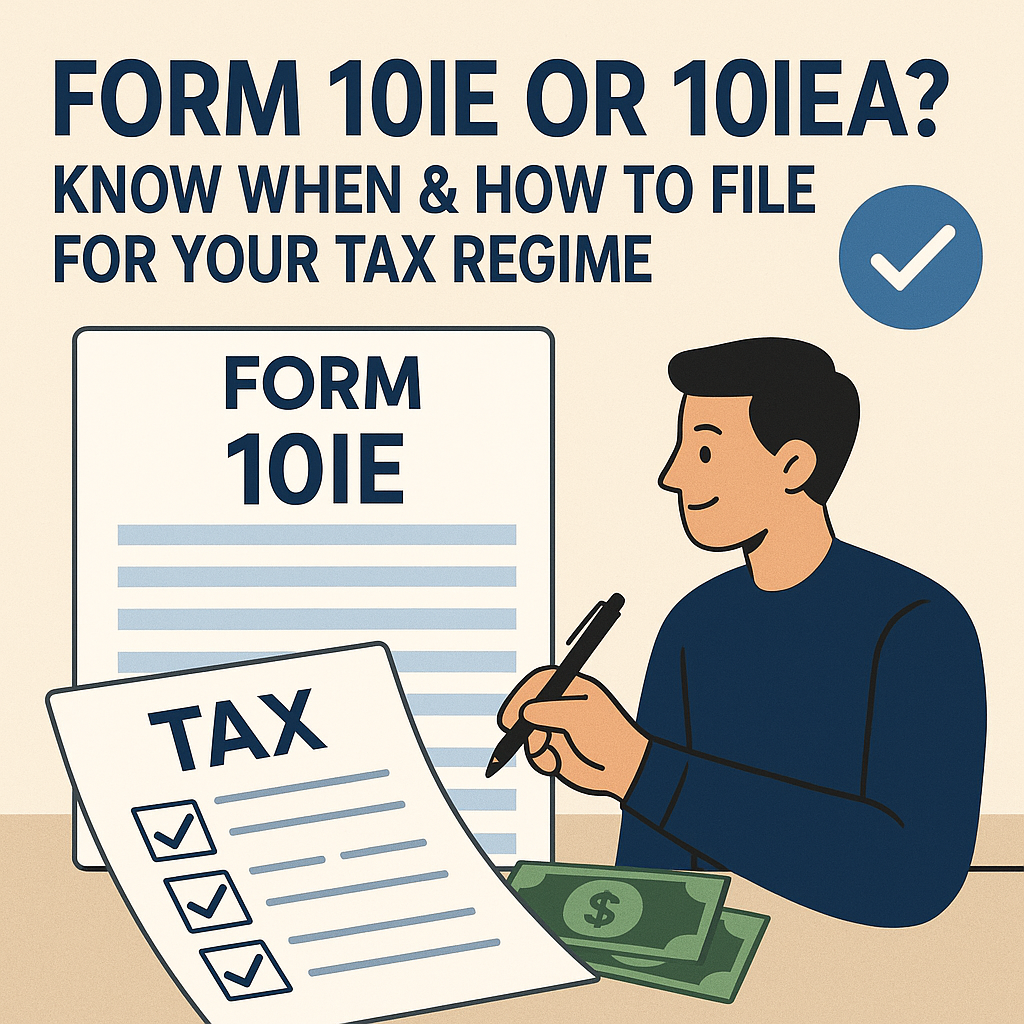- Form 10IE or 10IEA? Know When & How to File for Your Tax Regime
Table of Contents
In India, we now have two types of income tax systems:
- In India, we now have two types of income tax systems:
- Old Tax Regime: Higher rates but allows deductions like LIC, PPF, HRA
- New Tax Regime: Lower tax rates but no deductions
But here’s the confusion:
How does the government know which tax regime you’re choosing?
👉 This is where Section 10IE and 10IEA come into play.
🔍 What is Section 10-IE?
Section 10IE was applicable before FY 2023–24. It was used by those who wanted to choose the new tax regime under Section 115BAC.
🧑💼 Who should file Form 10-IE?
- Salaried employees
- Freelancers or professionals
- Small business owners
💡 Important: If you had business or professional income, you must file Form 10-IE before the due date of filing your ITR.
📌 Once opted with business income, you can only switch regime once.
🆕 What is Section 10-IEA?
From FY 2023–24 (AY 2024–25), the new regime became default. Now, if you want to stick to the new regime — no action is needed.
But if you want to move to the old tax regime, you need to file Form 10-IEA.
✍️ When to file Form 10-IEA?
If you want to claim deductions like:
- ✅ Section 80C (LIC, ELSS, PPF)
- ✅ Section 80D (Mediclaim)
- ✅ HRA, home loan interest, etc.
Then file Form 10-IEA before your ITR.
👨🏫 Example:
Ravi is a salaried person from Bahadurgarh. He invests in LIC, ELSS, and pays for health insurance.
For FY 2024–25, he wants to claim all deductions.
So, he must file Form 10-IEA to stick to the old regime. If, he not file return under ITR-1, ITR-2.
🗓️ Deadlines You Must Know
| Form | Regime Type | Deadline to File |
|---|---|---|
| Form 10-IE | New (before FY 23-24) | Before filing ITR |
| Form 10-IEA | Old (from FY 23-24) | Before filing ITR |
⏰ Don’t miss the deadline, or the IT portal will choose regime automatically (default: new regime).
❓ Old vs. New Regime: Which One to Choose?
| Feature | Old Regime | New Regime |
|---|---|---|
| Deductions allowed | ✅ Yes (80C, 80D, etc.) | ❌ No |
| Tax Rates | Higher | Lower |
| Standard Deduction | ✅ Yes | ✅ Yes |
| Default Regime | ❌ No | ✅ Yes (from FY 23–24) |
| Flexibility to switch | ✅ More flexible | ❌ Limited if business income |
👉 Choose Old Regime if you claim many deductions.
👉 Choose New Regime if you want simpler filing and don’t invest much.
📄 How to File Form 10-IE or 10-IEA?
- Login to Income Tax e-Filing Portal
- Go to e-File > Income Tax Forms
- Select:
- Form 10-IE (for new regime – before FY 23-24)
- Form 10-IEA (for old regime – from FY 23-24 onwards)
- Fill details
- Verify with Aadhaar OTP or DSC
- Submit & download acknowledgment
Difference Between 10IE and 10IEA
| Feature | Form 10IE | Form 10IEA |
|---|---|---|
| Applicable FYs | Up to FY 2022–23 | From FY 2023–24 onwards |
| Purpose | Opt IN for New Regime | Opt OUT of New Regime |
| Default Tax Regime | Old Regime | New Regime |
| When to File | Before filing ITR | Before filing ITR |
| Who Should File | Switching to New Regime | Switching back to Old Regime |
🧠 Suggestion
Choosing the right tax regime can save money and make your life easier during ITR filing.
🔁 Just remember:
- ✅ Form 10-IE = New Regime (before FY 2023-24)
- ✅ Form 10-IEA = Old Regime (from FY 2023-24 onwards)
📢 Filing the correct form is a must — otherwise, the Income Tax Department will not consider your choice.
While filing ITR for FY 2024-25 (AY 2025-26), I want to opt for the old tax regime instead of the default new tax regime, should I file Form 10-IEA before filing his income tax return (ITR)?
Taxpayers who do not have income from business or profession can simply tick the “Opting out of new regime” in the ITR form without the need to file Form 10-IEA,only those who file ITR-3, ITR-4 or ITR-5 have to submit Form 10-IEA if they have business income (other than coop societies). Individuals and HUFs filing their returns in Forms ITR-1 or 2 are not required to submit Form 10-IEA.
